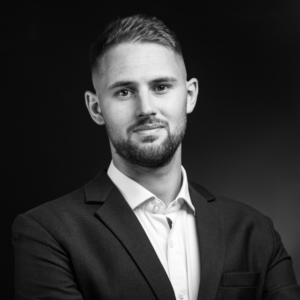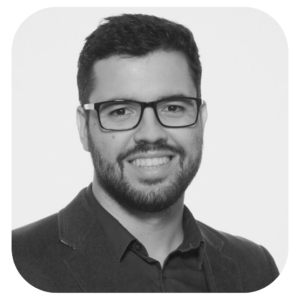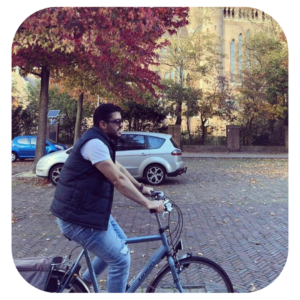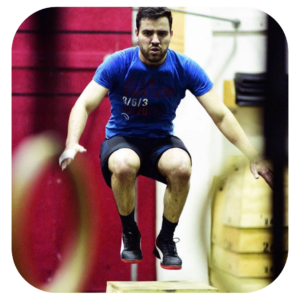Harvey John
Unit 2 Ferry Wharf
Hove Enterprise Centre
Basin Road North
Portslade, East Sussex
BN41 1BD
Whilst the tax world may appear very small, the range of specialisms that exist here is incredibly diverse. And what’s great about this is that, for each specialism, the experiences one has abroad are completely different.
So with the digitisation of tax being a huge topic, we’re very pleased to showcase our first Tax Technology Expat interview with João Bernardino. The rise of Tax Technology professionals (or Taxologists) marks an evolution in the traditional tax landscape that we once knew and João’s journey from Sao Paulo to Amsterdam signifies the challenges in this next chapter in the world of tax. Not only does he share the personal experiences of working in a new country, but we also dive deeper into the challenges he has faced when facing the nuances of different tax systems globally and how this affects technology demands!
Over to João…
João, welcome to The Tax Expat! With Amsterdam being one of the most popular destinations for tax professionals these days, we’re excited to hear about your experiences. Firstly, can you introduce yourself to those who don’t know you?
Thank you, Alex! Well, to begin, I was born and raised in the south of Brazil in Santa Catarina and I now work in tax technology in Amsterdam!
For me, the story started when I graduated in Computer Science and then secured my first job during my last year of college as an intern at a multinational Tax Technology company, called Neogrid. Here, I was part of the consulting and implementation team, where we implemented Brazilian E-Invoicing, Tax Calculation, and Compliance. And since then, I’ve stayed in consulting and implementation for the past 10 years of my career!
Thanks, Joao. A quick look at your resume shows that you’ve worked at some of the leading tax software houses over the years. What were your career movements following your internship at Neogrid?
Following Neogrid, I was able to understand that Tax Technology had some great career opportunities and – considering my technical background from college – I then started learning about indirect taxes to continue working towards becoming a great ‘Taxologist’.
My next role saw me joining Thomson Reuters in Sao Paulo as an Implementation Consultant where I reported to a remote team in the USA. At this point in my career, I was tasked with the challenges of implementing and managing TR’s portfolio in Latin America, which enabled me to continue learning, attending new courses, and undertaking new certifications. Having spent a couple of years in TR Brazil working with global projects, travelling to different countries enabled me to have a much greater career perspective of the Tax Technology area.
After pursuing some certifications in SAP, and project management, and concluding my master’s degree in Strategic Management in Information Technology, I decided it was time to look for an opportunity abroad and continue specialising in tax technology as the implementation projects I’d been doing had indicated that there’d be some great opportunities in the future for tax technology professionals. And since I have an Italian passport, Europe was the obvious choice! From there I went on to work for Sovos Compliance in Amsterdam and, now, Vertex.
We have a few clients in Sao Paulo, so I know a bit about the market but I’m still learning. What is the tax tech scene like in Sao Paulo?
The tax tech market in Sao Paulo is huge, and in general, there are a lot of tech companies based there too. But in terms of indirect taxes, Brazil is the most complex country in the world, sp to deal with that complexity, companies require great software and tax engines that are capable of dealing with calculation, compliance, e-invoicing, external API connections, etc. As a result, Sao Paulo has become a great market for Tax Technology!
I’m reminded frequently by clients and candidates of the complexity of Brazil’s ever-changing indirect tax system! I can imagine this presents some interesting challenges to say the least. What are the fundamental differences for a tax technology professional in Brazil compared to The Netherlands?
On a scale of one to ten for complexity (ten being highly complex), I’d say that Brazil scores a ’10’ and The Netherlands scores a ‘4’. But I don’t work only with the Netherlands, so we have to consider the VAT scenarios for Europe – Even so, a Tax Technology professional in Brazil is required to do different things than one in Europe. Take, for instance, an Implementation Consultant for Compliance in Brazil usually has to deal with SQL, installation, SAP or Oracle integrations and also understand the complexity of indirect taxes at the Federal, State and Municipal levels. In contrast, Europe typically has different people to deal with certain things, such as one consultant for installation, one for technical problems with the database, one VAT expert, and so on.
Taking advantage of your Italian passport, what did your movements in Europe look like?
In September 2017, I moved to Italy to get my Italian citizenship and continued to work remotely for Thomson Reuters until January 2018. Although TR offered me to work in their London HQ, I decided to accept an offer with Sovos and move to Amsterdam.
Then, during my second year in The Netherlands, I decided to take another step in my career and joined Vertex Inc. (also in Amsterdam), which is a multinational tax software company that provides end-to-end solutions from tax calculation to compliance reports.
I joined Vertex as a Solutions Manager for Europe, a great challenge that I’m excited about as we are expanding our products in the region and I get to utilise my background in tax technology to help our team with implementation, project management, and training.
Having now experienced both, what’s your preference: tax technology projects in LATAM or EMEA?
Customers in Latin America can be very difficult to deal with and, most of the time, they require you to be on-site. Some large companies will not even do business if you implement the project remotely, so your travelling becomes very extensive!
In Europe, I can see that remote projects are more common, but they are different markets, cultures and perspectives.
As it stands, I would say my career in Europe is better.
For those in a similar line of work to you, where do you feel are the top 3 ‘hot’ locations to advance your career?
- The Netherlands
- UK
- Spain
How has working in Europe developed you as a tax technology professional?
VAT is a new world to me and I’m constantly learning the different tax scenarios and combinations for compliance and tax determination purposes.
But not just VAT, having the opportunity to work with global companies, and different cultures, and understanding different technologies in this area has been crucial to my growth and development.
So you’ve been in Amsterdam for over a year now. What have been your first impressions of professional life in The Netherlands compared to that in Brazil?
In Amsterdam, I enjoy more work-life balance. Usually, people leave the office at 5 pm, because of the culture, they want to spend more time with family, In Sao Paulo, depending on the company, you can work until 9-10 pm every day!
Besides that, The Netherlands is a very organized country, with polite people, and English is an official language as well. So far I have only good things to say!
Based on your experiences, for any of our readers who are considering a move to Amsterdam, what else should they know about life in Amsterdam on a personal and social level?
I would say that Amsterdam (or any other city in The Netherlands) is a great destination to relocate to. It has amazing restaurants, and pubs, the country is very safe, transport works very well, and – a curious thing as you may know – we use bikes for everything in the Netherlands. I just love this; I didn’t feel the need to buy a car at all as I can use my bike and train everywhere in the country.
There is also a government incentive for highly skilled people hired from abroad, that’s called the Dutch 30% Ruling, which makes your salary a little bit higher compared to the rest of Europe.
Working abroad often comes with its challenges. What’s been the biggest struggle in the whole process for you?
I’ve always had a dream of living abroad and being able to use English for work, so I would say the international passion for creating my own path abroad has always been there.
Saying that, of course, I miss my family. But living in a very tourist and accessible city means that they come to visit me very often and I can also easily plan some vacations in Brazil.
What’s the most important thing you’ve learnt about yourself since moving abroad?
That I should always be persistent, never give up, be myself, commit to learning as much as I can, constantly create good relationships, and take advantage of working with multicultural teams.
Although your move is still quite fresh if you had your time again, is there anything that you’d have done differently?
I often say that everything has its time to happen for those who seek opportunities. I believe that everything happened at the right time as I was readily prepared to face this challenge.
So I would not have done anything differently because I believe that I made the right choice at the right time. My advice is to organize your life goals and conclude a stage every year, and soon you will be living where you want to.
Despite the fantastic time you seem to be having, there must be things you miss about life in Brazil.
The food for sure! Brazilian barbecue and Brazilian sushi are the best in the world.
Can you share any other advice with other tax technology professionals who are considering a relocation abroad for their career?
Think about your self-learning. There are great courses you can take in the tax technology area, like SAP / SAP 4Hana, Oracle, PMP, Indirect Tax certifications, etc.
But the most important thing is, before moving and before agreeing on a salary, try to get a feel for the company culture and how they manage careers and people. Make the most of the interview process to ask questions about the team environment and research deeper into the company as this will always help you match your expectations as a Tax Technology professional. You can have a great salary but if you are not happy doing what you do, it’s not worth it.
Listening to that as a Recruitment Consultant, that’s sound advice if I do say so myself!
João, thank you so much for being our first Tax Technology Expat! It’s been great to hear about your journey and take a deeper look into the nuances between the tax tech life in Brazil and Europe!
Are you a Tax Expat? If so, we’d love to hear about your experiences and share them with our global tax network. For more information, please contact Alex Mann.
If you would like to see our company updates and industry insights, follow our LinkedIn page here.
Author

From boutiques to the Big 4, and start-ups to multinational corporations, Alex manages a diverse portfolio of clients worldwide which has enabled him to develop a vast global network of indirect tax and tax technology professionals in 40+ countries.




